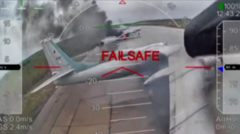Amid ongoing tensions post-Ukrainian drone strikes, Trump relayed Putin's threats, while both nations seek solutions amidst failed ceasefire talks.
Putin's Planned Retaliation: A Warning from Trump

Putin's Planned Retaliation: A Warning from Trump
After a phone call with Vladimir Putin, Donald Trump reveals the Russian leader's intentions to respond to recent Ukrainian drone attacks.
In a recent development following a significant drone attack on Russian airbases, former President Donald Trump has warned that Russian President Vladimir Putin is poised to retaliate. Trump conveyed this message after a lengthy phone call with Putin, marking their first discussion since Ukraine's surprise assault using drones to target missile-carrying aircraft in Russia.
According to Trump, who spoke through a social media platform, Putin expressed his intent to respond forcefully to the attacks. While Russian officials have not confirmed Putin's threats publicly, they alluded to potential military responses being "on the table," reinforcing the tense atmosphere surrounding the conflict.
The drone strikes by Ukraine were announced on June 1, targeting airbases that house nuclear-capable long-range bombers. Trump clarified during the call that the U.S. was not forewarned about the assault, a fact that could complicate the already precarious dynamics between the nations involved.
Ukrainian Minister of Strategic Industries, Yuriy Sak, expressed hope that the U.S. would react to the continuous Russian missile and drone strikes with increased sanctions and pressure on Russia. Trump further threatened a reassessment of the U.S. response if he perceived that Putin was stalling peace efforts.
In stark contrast, Ukrainian President Volodymyr Zelensky emphasized the futility of dialogue with Russia thus far, noting the necessity for a strong international response to dissuade further aggression from Putin.
In an update, a Ukrainian delegation, including Deputy Prime Minister Yulia Svyrydenko, was set to meet U.S. senators to discuss military support as well as broader strategies to mitigate the conflict. However, recent peace talks in Istanbul ended without significant advancements, particularly on the crucial issue of a ceasefire.
Additionally, Trump's communication with Putin touched upon Iran and its nuclear ambitions, with both leaders seemingly in agreement that nuclear weapons should not be part of Iran’s future. Yet, Iran has been slow to respond to proposed discussions, which adds another layer to the already complex geopolitical landscape.
As the situation unfolds, the threat of retaliation looms large, and the potential for a renewed escalation in hostilities between Ukraine and Russia continues to exert pressure on international relations and peace prospects.




















